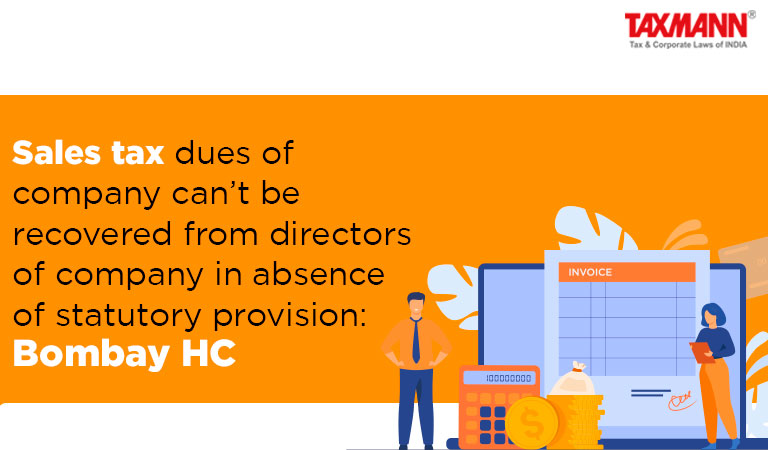Sales tax dues of company can’t be recovered from directors of company in absence of statutory provision: Bombay HC
- News|Blog|GST & Customs|
- 2 Min Read
- By Taxmann
- |
- Last Updated on 10 November, 2022

Case Details: Mukesh D. Ramani v. State of Maharashtra - [2022] 144 taxmann.com 135 (Bombay)
Judiciary and Counsel Details
-
- K.R. Shriram & Gauri Godse, JJ.
- Sriram Sridharan for the Petitioner.
- Ms Jyoti Chavan, Himanshu Takke & Dushyant Kumar AGP’s for the Respondent.
Facts of the Case
The petitioner was a director of a company and the department issued notice demanding sales tax dues of company from the director. The orders were passed to recover dues under the Bombay Sales Tax Act (BST Act) by relying upon the provisions of Section 142(8) and Section 89 of the GST Act. It filed writ petition challenging the recovery of dues.
High Court Held
The High Court noted that the liability for duty of the company can’t be fastened upon the directors of the company unless there is statutory provision to that effect as per the settled position in law. In the instant case, amount was demanded by invoking Section 142(8) of the GST Act but this section would only be applicable when the amount first becomes recoverable in terms of the “existing law”.
However under the BST Act, there didn’t exist any section which provided for dues of the company to be recoverable from its Directors. Therefore, it was held that no amount would be recoverable under the BST Act from the directors of the company for the dues recoverable from the company.
List of Cases Reviewed
-
- Narinder Singh v. Union of India [2019] 367 ELT 775 (Punj. & Har.) (para 21)
- Maganbhai Hansrajbhai Patel v. Asstt. CIT [2012] 26 taxmann.com 226/211 Taxman 386/[2013] 353 ITR 567/256 CTR 269 (Guj.) (para 23)
- Ram Prakash Singeshwar Rungta v. ITO [2015] 59 taxmann.com 174/370 ITR 641 (Guj. – Mag.) (para 24)
- Gul Gopaldas Daryani v. ITO [2014] 46 taxmann.com 35/227 Taxman 190 (Mag.)/367 ITR 558 (Guj.) (para 25)
- Parle International Ltd. v. Union of India followed.
List of Cases Referred to
-
- Satish D. Sanghavi v. Union of India [2012] 25 taxmann.com 328 (Bom.) (para 15)
- Narinder Singh v. Union of India 2019 (367) ELT 775 (Punj. & Har.) (para 21)
- Maganbhai Hansrajbhai Patel v. Asstt. CIT [2012] 26 taxmann.com 226/211 Taxman 386/[2013] 353 ITR 567/256 CTR 269 (Guj.) (para 23)
- Ram Prakash Singeshwar Rungta v. ITO [2015] 59 taxmann.com 174/370 ITR 641 (Guj. – Mag.) (para 24)
- Gul Gopaldas Daryani v. ITO [2014] 46 taxmann.com 35/227 Taxman 190 (Mag.)/367 ITR 558 (Guj.) (para 25)
- Parle International Ltd. v. Union of India [Writ Petition No. 12904 of 2019, dated 26-11-2020] (para 32)
- Sushitex Exports India Ltd. v. Union of India [W.P. (L) No. 9641 of 2020, dated 14-1-2022] (para 33).
Disclaimer: The content/information published on the website is only for general information of the user and shall not be construed as legal advice. While the Taxmann has exercised reasonable efforts to ensure the veracity of information/content published, Taxmann shall be under no liability in any manner whatsoever for incorrect information, if any.

Taxmann Publications has a dedicated in-house Research & Editorial Team. This team consists of a team of Chartered Accountants, Company Secretaries, and Lawyers. This team works under the guidance and supervision of editor-in-chief Mr Rakesh Bhargava.
The Research and Editorial Team is responsible for developing reliable and accurate content for the readers. The team follows the six-sigma approach to achieve the benchmark of zero error in its publications and research platforms. The team ensures that the following publication guidelines are thoroughly followed while developing the content:
- The statutory material is obtained only from the authorized and reliable sources
- All the latest developments in the judicial and legislative fields are covered
- Prepare the analytical write-ups on current, controversial, and important issues to help the readers to understand the concept and its implications
- Every content published by Taxmann is complete, accurate and lucid
- All evidence-based statements are supported with proper reference to Section, Circular No., Notification No. or citations
- The golden rules of grammar, style and consistency are thoroughly followed
- Font and size that’s easy to read and remain consistent across all imprint and digital publications are applied



 CA | CS | CMA
CA | CS | CMA
